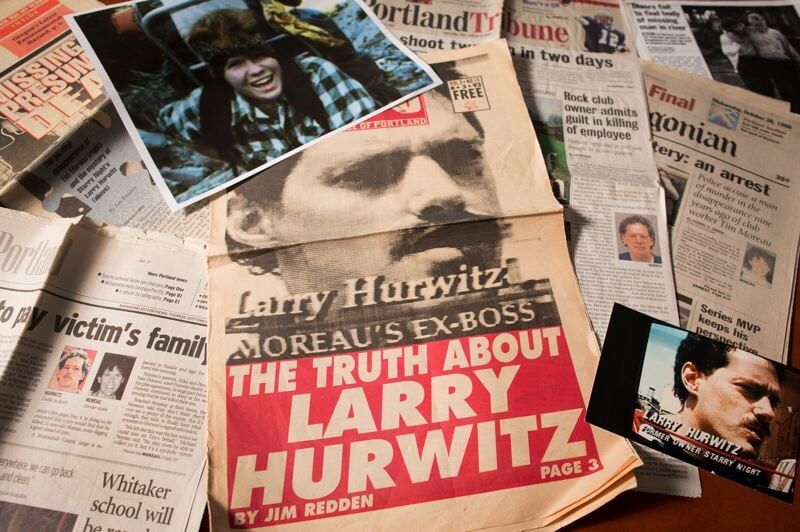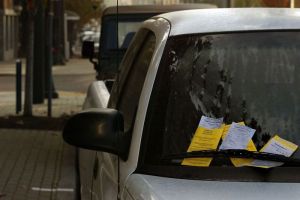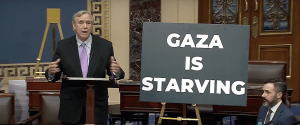The Starry Night Murder Chapter 23: Spray-painted Loafers
Published 12:00 am Tuesday, June 18, 2019

- Souvenirs from more than 10 years of reporting about the 1990 murder of Tim Moreau include a photograph of him from around the time he moved to Portland (top) and a screen shot of Larry Hurwitz from a 1992 local TV news story about the case (bottom).
“Dead man walking,” Bruce McLaughlin said as Larry Hurwitz rounded the corner and began moving down the marble-lined hallway in the Multnomah County Courthouse. Even in his drab, prison-issued blue jump suit, Hurwitz was an imposing figure, physically larger than either of the two sheriffs deputies beside him. Hands cuffed behind him, he walked stiffly down the hall, staring straight ahead with blank, glazed eyes. As Hurwitz approached him, McLaughlin said “Dead man coming through” loud enough for everyone in the hall to hear. Hurwitz didn’t even flinch as he was swept into Courtroom 226 to face five counts of aggravated murder.
Trending
With his shoulder-length red hair and natty blue suit, McLaughlin looked like a middle-aged British rock star. In fact, he’s a Portland attorney who has attended nearly all of Hurwitz’s court appearances since he was arrested on federal income tax evasion charges in late 1997. McLaughlin’s interest in Hurwitz isn’t professional, however. It’s personal. “I used to work for him and he screwed me over,” McLaughlin said. “I just want to see him get what’s coming to him.”
Such animosity toward Hurwitz isn’t unusual. Portland police investigator Hershel! Lange interviewed dozens of his former associates while helping build the murder case against him. “Nobody had a single good word to say about him. Lange said before the arraignment. “Not one.”
McLaughlin and Lange weren’t the only people who wanted to see Hurwitz get what’s coming to him. So did Debra Meyer, the Internal Revenue Service investigator who laid the groundwork for the tax evasion charges. Even though her work on the case officially ended when Hurwitz pleaded guilty and began serving a one-year federal prison term in August of this year, Meyer showed up at the courthouse on the morning of Wednesday, November 26 — the day before Thanksgiving. “I wouldn’t have missed this for the world,” she said.
Trending
Two people who didn’t make it were Mike and Penny Moreau, the parents of Tim Moreau, the young man Hurwitz is charged with killing. According to the indictment, Hurwitz killed Moreau on January 23, 1990, to hide his — Hurwitz’s — role in a counterfeit ticket scam. At the time, Hurwitz owned and operated Starry Night, a mid-sized concert hall at the corner of NW 6th and Burnside. Three days earlier, on January 20, approximately 180 counterfeit tickets were discovered at a John Lee Hooker concert promoted by the local production company of Monqui Presents.
Hurwitz immediately threw the blame for the counterfeits on Moreau, his publicity manager. As laid out in the indictment, however, Moreau wasn’t responsible for the fake tickets — Hurwitz was, and he murdered Moreau when he wouldn’t take the fall for them. According to the police, another Starry Night employee named George Castagnola helped Hurwitz kill Moreau and dispose of the body. Castagnola pleaded guilty to his role in the murder on November 20. He was sentenced to 10 years in prison after agreeing to testify against Hurwitz before the Multnomah County grand jury which indicted him, and at any subsequent trial.
Although Mike and Penny Moreau live in New Orleans, they have attended virtually all of Hurwitz’s court appearances. They passed up the arraignment on the murder charges, however, after being told it would only be a short, technical proceeding. It was a good decision. Flying in and out of Portland would have been a nightmare. The arraignment took place during the first major rain storm of the winter. Air travel, already strained by the Thanksgiving holiday, was further disrupted by the high winds, which howled down the streets outside the courthouse as Hurwitz entered the courtroom a little after 10:30 am.
Larry Hurwitz stood before Circuit Court Judge Joseph E. Ceniceros, the same man who accepted George Castagnola’s guilty plea. Hurwitz was represented by Daniel Feiner, the attorney from his IRS case, and Charles Rogers, a former federal public defender from California who moved to Portland a few years ago.
Deputy Multnomah County District Attorney Norm Frink represented the state. Tall and lean, with close-cropped greying hair, Frink is widely regarded as a conservative, no-nonsense prosecutor. Many defense attorneys think he’s too tough, as if you would expect a professional prosecutor to be anything else.
Judge Ceniceros opened the hearing by asking Feiner and Rogers whether they’d been properly served with the indictment. When they said yes, he asked if they were prepared to enter a plea. “We plead not guilty to all five counts,” Feiner said.
No one in the courtroom took this to mean that Hurwitz isn’t guilty. Because Feiner and Rogers had only been appointed to represent Hurwitz a few days earlier, the arraignment was essentially a formality, not a true confrontation between the prosecutor and defense attorneys.
Frankly, it’s hard to see how Hurwitz can beat the murder rap. Even though Moreau’s body has yet to be found, several people with information about the killing are prepared to testify against him. One is Castagnola, who has already admitted helping him kill Moreau. So, apparently, is Harvey Freeman, Hurwitz’s former father-in-law, who was working at Starry Night at the time of the killing.
According to numerous sources, Hurwitz asked Freeman to help dispose of Moreau’s body after the killing. Although Frink and other law enforcement officials won’t confirm it, Hurwitz may have used Freeman’s car, an old Cadillac, to carry the body over to the Washington side of the Columbia River Gorge, where it was buried.
Remarkably, the police may have a record of this trip. Law enforcement sources won’t deny rumors that Hurwitz and Castagnola — and, possibly, Freeman — were stopped by a police officer on their way back into town. It’s not clear whether the officer was attached to the Oregon State Police or the Portland Police Bureau. Nor is it clear why it took so long for investigators to link this stop to the murder. But, if the rumors are true, prosecutors can place Hurwitz in a car with Castagnola coming back from where Moreau’s body is reportedly buried on the night of the killing.
But apparently that’s not all they have against Hurwitz. Other rumors contend that he confessed his role in the killing to one or more people. Perhaps that’s why Beatrice Wolbaum, his former girlfriend, was called before the grand jury which indicted him.
More information is likely to emerge early next year. Judge Ceniceros set January 6, 1999, for further proceedings. That’s when the defense strategy will begin to emerge. Hurwitz will have had plenty of time to meet with his attorneys between now and then.
Of course it’s also possible that Hurwitz may follow Castagnola’s lead and cut a deal — escape the death penalty in exchange for a sentence of life without parole, or maybe even less if Frink is feeling charitable. Of course, because Hurwitz is already 44, even a certain 25 years is almost a death sentence. No one will have much use for a 69-year-old former concert hall owner.
Immediately after Judge Ceniceros set the next hearing, the two sheriffs deputies handcuffed Hurwitz and marched him out of the courtroom. He walked right past me without making eye contact. As he was pushed out the door, I noticed he was wearing furry brown loafers spraypainted bright orange. I smiled, think how fashionably Hurwitz has always dressed in the past.
After the arraignment, I lingered in the hallway until all of the lawyers, reporters, and other observers drifted away. Then I walked up to the bulletin board outside the courtroom, where a copy of the daily schedule was attached with a single thumbtack. It read:
HON. JOSEPH F. CENICEROS CIRCUIT COURT
RM. 226
WEDNESDAY, NOVEMBER 25, 1998
10:30 a.m. -ARRAIGNMENT
State v. Larry Hurwitz CUSfODY
9811-39654/DA 1156175
Cts. 1-5: Aggravated Murder ODA: Norman Frink
Def. Atty: Dan Feiner
I pulled the tack and slipped the schedule into my notebook. That night I faxed it to Mike and Penny Moreau in New Orleans.
On January 6, 1999, Judge Ceniceros set the murder trial for October 26.







